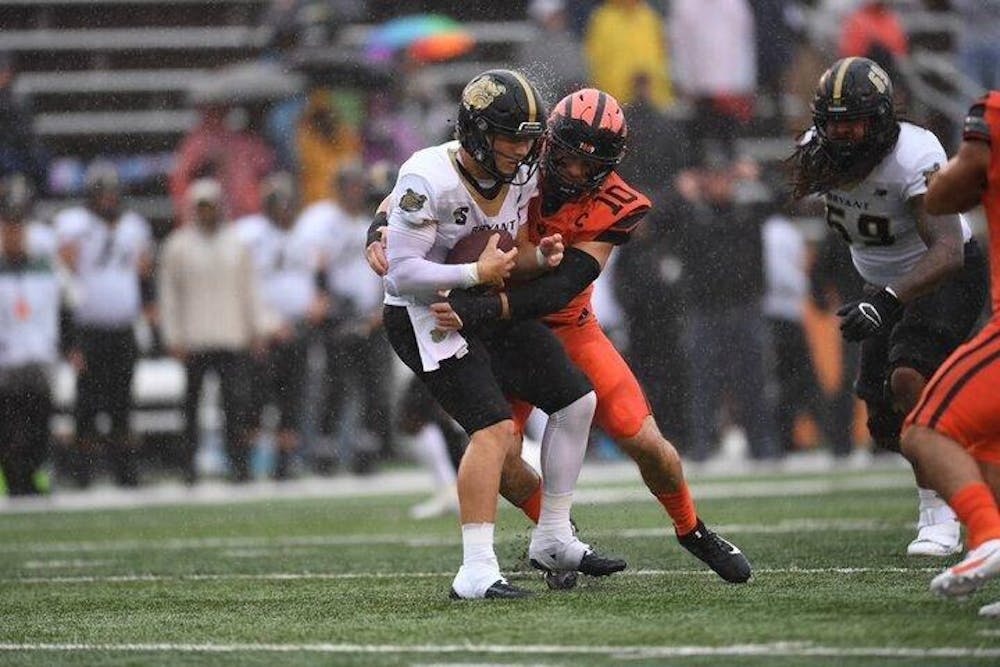On Nov. 6, 1869, Rutgers University defeated Princeton University 6–4 in the first-ever game of intercollegiate football. Over the past 154 years, football has grown in popularity and complexity, and Princeton’s typical roster has almost doubled in size.
In the past three seasons of gameplay, Princeton consistently remains a top-three team in the Ivy League, but the Tigers also play against many more schools than just the seven other schools in its conference. Each season, the Princeton Tigers play 10 games between September and November across the country, but mainly in the Northeast, where all conference competition is located.
The Daily Princetonian broke down the history of Princeton’s football games since 2000, including 222 games against 22 colleges, analyzing wins, losses, and weather. Only nine games were played in 2001 as the Sept. 15, 2001 game was canceled after the Sept. 11 attacks. No games were played in 2020 as they were canceled due to the COVID-19 pandemic.
Princeton’s football team, the Princeton Tigers, have played better in the past few seasons compared to other periods within the last 22 years. Since 2012, the Tigers have seen a winning percentage at or above 50 percent following a five-year stint of loss-prone seasons. With a better winning percentage at home compared to away, the home-field advantage is evident.
“Home games are advantageous because you have mostly a crowd full of your fans,” Johnson wrote to the ‘Prince.’ “You also get your own locker room and more familiar space as a player to warm up/maneuver. Similar to those reasons, the band is on our side so it helps with the overall momentum and crowd.”
Cheer team member Tom Billington ’26 added to that, saying, “being away, not only is the cheer team not there, but a lot of fans potentially as well aren’t there to get behind the team.”
Even with the entire undergraduate and graduate student body present at a home game, Princeton’s stadium might still feel empty. Princeton’s roughly 9,000 students would fill less than a third of its 30,000-seat stadium. Still, since 2000, the Tigers have won 53 percent of away games and 58 percent of home games.
The highest number of games have been played in Princeton, N.J., as home games account for half of the total games played each season. After New Jersey, New York schools have hosted Princeton’s football team for the most games. With two Ivy League schools located in New York, Columbia University and Cornell University, Princeton has traveled to play each team 11 times in the past 23 years. The sole neutral game of the past 23 years, where neither team was home or away, took place on Nov. 9, 2019, in Yankee Stadium, when Princeton lost to Dartmouth 27–10.
Princeton has played 11 away games against Harvard in Cambridge, Mass., winning five. Despite a losing record, this is the favorite away stadium of middle linebacker and captain Liam Johnson ’24. “[Harvard] has a great atmosphere,” Johnson wrote in a message to the ‘Prince.’

The Tigers’ total wins since 2000 were consistently lower than their total losses until 2018, when the Tigers had an undefeated season, winning all 10 games, including all seven within the conference. The Tigers clinched their 12th Ivy League title for football that year. The Princeton football team’s most recent title was in 2021 after they won all but one game, a 31–7 road loss at Dartmouth.
Princeton’s two worst seasons of the past 22 years were in 2010 and 2011, with two combined wins over the two seasons. A 2011 Princeton Alumni Weekly article blamed the losses on injuries, with 13 players sidelined by the third game of the 2010 season.
The ‘Prince’ also found that as temperatures increase, Tigers often see more football home game wins. In nicer weather, fans are more likely to attend home games, perhaps increasing winning percentages. This also could be due to the fact that Princeton is the second-most southern Ivy League school, meaning that the University does not get as cold as schools further north, and the team is able to practice in warm weather for longer.
“Towards the end of the season, I think we noticed that the crowd sort of dwindled slightly, but then, like, one of the bigger games towards the end was the Harvard game and that’s always a big game, so I feel like it just depends also on our opponents,” Billington said.
Each year, the first two scheduled games are not within the Ivy conference. Princeton often wins these games, making the average temperature of home game wins higher because these games are early in the season.
“The good thing about weather is that it affects both teams,” Johnson wrote. “It’s just a matter of who has prepared better to play in the elements.”
Our analysis shows Princeton is often more prepared to play when the weather is better.
The second game of the 2023 season marked the first time since 2016 that the team lost a non-conference game, losing 16–13 to Bryant University and breaking a 17-game non-conference winning streak. Even though the game was rescheduled by three hours to avoid heavy weather, much rain and wind ensued, affecting players and crowds.
“Our first [home] game of the season against Bryant was raining quite heavily,” Billington said. “But there was still a pretty decent turnout in consideration of the weather. On days where it’s warmer or just not raining, then that tends to be a lot of fun.”
The warmer weather is often seen at the beginning of each season, in September and early October. While Princeton has historically won only once more in September than in November, the team has played 20 fewer games in September than in November.
Andrew Bosworth is an assistant Data editor for the 'Prince.'
Please direct all corrections requests to corrections[at]dailyprincetonian.com.








